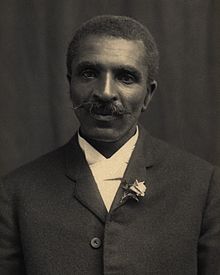Late last year, Peggy and I were vacationing in Alabama. Driving along Interstate 85, I noticed signs for Tuskegee, Alabama. It took me a few miles to put things together, but I started to recall my history lesson about George Washington Carver and his passion for soil health. In one of those unplanned side trips, Peggy and I exited I85 and toured the George Washington Carver Museum on the campus of Tuskegee University.

The son of a slave woman, Carver was born into slavery, and spent his childhood in Missouri. In 1888, Carver moved to Iowa with the hope of attending college. Two years later, he enrolled at Simpson College, studying art and piano. Carver transferred to Iowa State Agricultural College (ISU) in 1891, becoming the first African-American to enroll, and the first African-American faculty member, at ISU.
After earning his master’s degree from Iowa State Agricultural College in 1896, Carver was recruited by Booker T. Washington to join the faculty at Tuskegee University. There, Carver continued to build a reputation for research, teaching, and outreach. Carver’s life goal was to improve the living conditions of people in his rural surroundings. His discoveries of new products derived from crops like peanuts, soybeans and sweet potatoes, are well known. Yet, one of Carver’s more important credits is his contribution to soil health. “We must enrich our soil every year instead of merely depleting it. There is a distinct relationship between the soil and the person living on it. Show me a poor lot of land and I’ll show you a poor farmer”. His words, spoken in 1940, gives us an appreciation for Carver’s forward-thinking philosophy.
As we continue to work towards healthy soil and clean water, it is important to remember and honor those researchers, teachers, and conservationists who ventured before us. Conservation has never been an easy discipline. But as B.C. Forbes once said, “history has demonstrated that the most notable winners usually encountered heartbreaking obstacles before they triumphed. They won because they refused to become discouraged by their defeats”.
George Washington Carver started his life as a slave and persevered in his pursuit to improve the lives of people living in an agrarian society. Incidentally, he became a respected and world-renowned agriculturalist while doing so. We could all strive to do better; to prevail against the obstacles that get in the way of protecting our soil and water.
 Precision Conservation Book
Precision Conservation Book
Tom,
Thanks for reminding us about George Washington Carver’s many contributions to agriculture as it is practiced today.
George Washington Carver inspired me while I attended Iowa State University many moons ago. He was the first African American to become a faculty member there, after attaining his Master’s Degree. P.S. You and Peggy look great in the Alabama sun!
Thanks Mary, as an undergraduate I didn’t fully appreciate what George Washington Carver did for my discipline of agronomy. And yes, Peggy always looks great.
So very true and well said, Tom. Take care of the land and the land will take care of you.
Thank you Mary. I agree.
Thank you, Tom. This seems like a very appropriate essay on Martin Luther King, Jr.’s birthday. I appreciate how this essay combines soil health, water quality, and civil rights, and has a unique Iowa connection.
Thanks for reminding us of our history and for encouraging us to continue the work of soil health and water quality as we stand on the shoulders of giants!
Steve Hopkins
Steve, thanks for your comment. Honestly I gave little thought to the MLK’s birthday and the timing of my article. Thanks for pointing that out. After Tuskegee University, Peggy and I did travel on to Montgomery, AL where we toured the Rosa Parks Museum, The Legacy Museum: From Enslavement to Mass Incarceration, and the National Memorial for Peace and Justice. All very sobering.